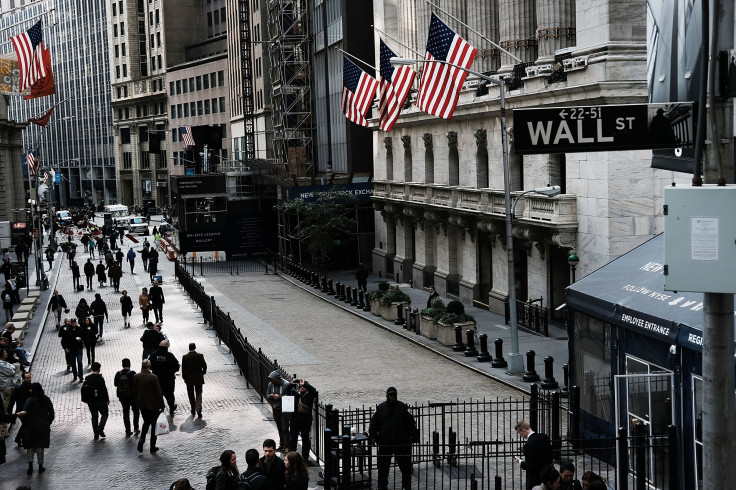US Stock Markets Lower As Investors Await Word On Interest Rates

Investors awaited Wednesday’s U.S. Federal Reserve action on interest rates as tensions mounted over the weekend attack on Saudi Arabia’s biggest oil facility and the likelihood of a no-deal Brexit grew.
At midday, the Dow Jones Industrial Average dropped 68 points or 0.24%. The Nasdaq Composite was off 0.39% and the S&P 500 dipped 0.27%.
The Fed’s Federal Open Markets Committee was widely expected to cut interest by 25 basis points at the close of its two-day meeting to help cushion the economy from the trade war with China and a global slowdown. President Trump has been pushing for more drastic action, but Fed Chairman Jerome Powell signaled the central bank would resist political pressure.
The focus will be on how the Fed frames the case for future cuts in the federal funds rate, which currently stands at 2% to 2.25%. The FOMC has two more meetings this year, next month and in December. Observers expect at least one more cut this year.
The Fed already has moved to calm money markets by jumping into the repurchase market with $50 billion to tamp down interest rates. It’s been more than a decade since the Fed injected cash into U.S. money markets but took action Tuesday to trim short-term rates that had spiked as high as 10% for overnight loans. The central bank is expected to inject $75 billion more into the market Wednesday, underscoring deep structural problems in U.S. money markets. Reserves banks park with the Fed are at their lowest level since 2011.
Investigators continued to examine evidence following Saturday’s attack on the Aramco facility at Abqaiq and nearby oil fields that wiped out half of Saudi production capacity, sending oil prices skyrocketing. The Saudis said Tuesday half that capacity had been restored and officials expected to be back at full capacity by the end of the month. Saudi Energy Minister Prince Abdulaziz bin Salman vowed those responsible for the attack would be brought to justice.
Preliminary investigation indicates the weapons used – drones and cruise missiles – were Iranian in origin. Though Yemeni Houthi rebels claimed responsibility, indications were the attack came from the north, either originating in Iran or a vessel in the Persian Gulf. Tehran has denied responsibility.
The U.S. is considering how to respond to the attack. President Trump tweeted he had directed Treasury Secretary Steven Mnuchin “to substantially increase” punishing economic sanctions on Iran.
Trump had been flirting with meeting Iranian President Hassan Rouhani on the sidelines of the U.N. General Assembly meeting next week but Supreme Leader Ali Khamenei ruled that out Tuesday and media reports from Iran say Rouhani and other officials may skip the meeting altogether.
European Commission Jean-Claude Juncker said this week a no-deal Brexit is becoming more likely since Britain’s Johnson has yet to make any concrete proposals. The pronouncement came as the Supreme Court in London heard argument over whether Johnson’s suspension of Parliament was legal or a means of silencing opposition debate on Brexit.
On global markets, Asian markets were mixed. The Hong Kong Heng Seng closed off 0.13%, Japan’s Nikkei 225 dipped 0.18% and China’s Shanghai Composite gained 0.25%. The Australia S&P/ASX fell 0.2%.
London’s FTSE 100 closed flat, the German Dax was up 0.17% and the French CAC 40 added 0.09%. The British pound was off 0.19% against the dollar while the euro was down 0.12% and the U.S. dollar index was 0.08% higher.
Oil was lower. Crude oil futures were off 1.89% and Brent crude lost 1.3%. Gold higher but silver fell.
© Copyright IBTimes 2024. All rights reserved.






















